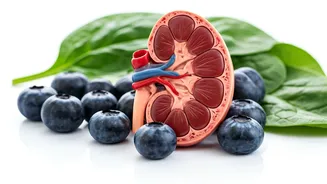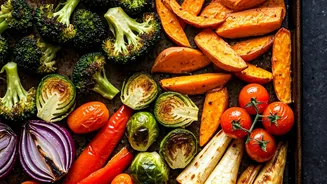Kidney Health Basics
The kidneys play an essential role in filtering waste and excess fluids from the body. When they're not functioning correctly, it can lead to a buildup
of toxins and several health complications. It's imperative to nurture these organs through a balanced diet and conscious lifestyle choices. Proper nutrition can significantly influence the health and longevity of your kidneys. Therefore, prioritizing foods that support kidney function and avoiding harmful ones becomes a proactive approach to prevent kidney-related issues, promoting overall well-being.
Embrace Fatty Fish
Fatty fish, such as salmon, mackerel, and tuna, are rich in omega-3 fatty acids, which have potent anti-inflammatory properties. These essential nutrients can help reduce inflammation throughout the body, including the kidneys. Inflammation is a major factor in the progression of kidney disease. Regular consumption of fatty fish can contribute to improved kidney function. They also provide high-quality protein, vital for maintaining overall health. The healthy fats present in these fish are beneficial for cardiovascular health, indirectly supporting the kidneys, as kidney function is closely tied to the health of the circulatory system. Integrating fatty fish into your diet, can be a tasty and effective step towards better kidney health.
Blueberries for Benefits
Blueberries are packed with antioxidants, particularly anthocyanins, that can help protect the kidneys from damage caused by free radicals. These little berries are also low in sodium, phosphorus, and potassium, which are minerals that need to be monitored in those with kidney disease. The antioxidants in blueberries can safeguard kidney cells and improve kidney function. The incorporation of blueberries in your diet provides a protective boost, reducing the risk of kidney damage. These benefits are also linked to improved blood sugar control and cardiovascular health, which is beneficial for the overall health of the kidneys.
Red Bell Peppers
Red bell peppers are another excellent addition to a kidney-friendly diet. They are low in potassium, a mineral that can accumulate in the blood in individuals with kidney problems, potentially leading to complications. These peppers are rich in vitamins and minerals like vitamin C, vitamin A, and antioxidants. These nutrients support overall health and offer additional protection against kidney damage. The vibrant colors of red bell peppers also mean they contain beneficial antioxidants, helping reduce inflammation. Therefore, incorporating red bell peppers into your meals is both delicious and beneficial for your kidneys.
Olive Oil's Advantage
Olive oil is a healthier fat choice that can be beneficial for those looking to improve their kidney health. It is a good source of monounsaturated fats and is often used as a healthier alternative to other cooking oils and fats. Olive oil is lower in saturated fats. It provides the body with good fats, which are important for maintaining kidney function. Olive oil's anti-inflammatory properties can also help reduce the burden on the kidneys. Use olive oil in cooking, for dressings, or as a finishing touch for salads to support kidney health while also maintaining a balanced diet.
Sugar, Watch Out
Excessive sugar consumption can be detrimental to kidney health. High sugar intake can lead to obesity and diabetes, which are major risk factors for kidney disease. When you eat too much sugar, it can lead to increased stress on your kidneys. The kidneys work harder to filter the blood and manage blood sugar levels. Cutting back on sugary drinks, processed foods, and added sugars is essential. Being mindful of sugar intake can help improve overall health and reduce the risk of kidney disease. Replacing sugary items with healthier alternatives like fruits or natural sweeteners may be beneficial.
Limit Processed Foods
Processed foods are often high in sodium, phosphorus, and unhealthy fats. These ingredients can put a strain on the kidneys. High sodium intake can increase blood pressure, which is a major contributor to kidney disease. Excessive phosphorus intake can also lead to bone problems. Avoiding processed foods and preparing meals at home allows you to control the ingredients and promote kidney health. Opting for fresh, whole foods provides your body with the nutrition it needs without the harmful additives and excess sodium that can harm the kidneys. Choose a balanced and nutritious diet.
Reduce Red Meat
High protein intake from sources like red meat can be hard on the kidneys. When the body metabolizes protein, it creates waste products that the kidneys must filter out. A high-protein diet puts extra pressure on the kidneys, potentially speeding up kidney disease progression. Moderation is key. Balancing protein intake with other essential nutrients is important. Choosing leaner protein sources, such as fish, poultry, or plant-based proteins, can reduce the strain on the kidneys. It is crucial to have a balanced dietary approach to support overall health and protect the kidneys from unnecessary strain.
Watch Your Salt
Excessive sodium intake is a major concern for kidney health, as it elevates blood pressure, making the kidneys work harder. High blood pressure is a leading cause of kidney damage, so controlling your sodium intake is a critical step in prevention. It's not just about adding salt to food. Sodium is often hidden in processed foods, canned goods, and fast food. Become label-conscious and check sodium content on food packaging. Choose fresh, unprocessed ingredients, and use herbs and spices to add flavor. Making conscious choices about salt intake can significantly contribute to better kidney health and help prevent damage associated with high blood pressure.





















